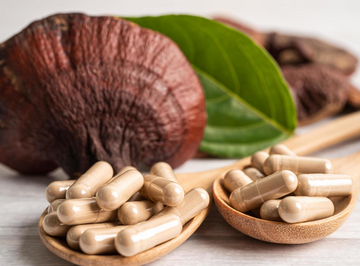With talk about superfoods, supplements, and all things health gaining serious traction in recent years, you may well have stumbled upon buzzwords like Nootropics and Adaptogens. So what are they, and how do they spark your mind? Here’s a look into some examples of these brain-boosting botanicals and how they can promote and maintain your cognitive abilities and vitality.
What are Nootropics?
For many of us with jobs requiring long stints of focus; an easy way to magically provide just that extra boost in concentration seems ever so alluring. Welcome to the world of Nootropics, a group of natural or synthesized compounds that are beneficial to the health and performance of your mind (1). Nootropics can be found in consumable formats like whole ingredients, pills, powders, drinks and more.Although “Nootropics” is a new growing trend, the study and use of brain-boosting botanicals to enhance cognitive health and performance has actually been around for centuries. If you’re based in Asia, you’ve probably heard of Ginseng, especially being a great health tonic. It’s also commonly found in East Asian cuisine, most often in tea and also in side dishes in South Korea. But did you know Ginseng also has nootropic properties? Research studies (2) report that having Ginseng regularly over a span of more than 5 years enhances acute memory function in younger adults. In fact, regular Ginseng consumption can heighten your short-term focus and your ability to recall finer details.

Most people have consumed Nootropics without even knowing it – in the form of one of the world’s most loved treats, Chocolate. The main ingredient, Cacao, has been proven to act as a powerful nootropic. Now, before you go on a chocolate-eating spree in the hopes of feeling a rush of concentration and focus, it is worth noting that the sugar and fat content in most processed chocolate treats will do you more harm than good. However, cacao as a standalone ingredient has reported benefits on focus, mood, and energy. Key to these benefits is a chemical called Theobromine, which is found in both cacao and coffee. Cacao can be a great alternative to coffee by boosting your mood and alertness without the jitters and crashes that can come with drinking coffee (and consuming caffeine) regularly (3). Additionally, flavanols in Cacao help to regulate blood flow to the brain, vitalizing your mind and enhancing its ability to perform cognitive tasks (4).
What are Adaptogens, and how are they different?
While Nootropics can be seen as enhancers for focus and alertness, the role of Adaptogens is more about returning to a balanced state, lowering your stress levels, and in turn priming your mind to function optimally. Adaptogens are natural herbs or mushrooms that can relieve stress in addition to boosting immunity (5), and are now a key element of many popular health supplements.We’ve all had our fair share of sick days, and the frustration of being bedridden and out of action for days is agonizing. That’s where Adaptogens can come in. Echinacea, also commonly known as coneflower, has served as a powerful remedy for illness. As it turns out, a few drops of Echinacea extract daily can reduce your recovery time significantly (6) and have you back on your feet quickly.
Similarly to the nootropic Ginseng, Reishi (also known as Lingzhi) has been used as a natural remedy in East Asia for centuries. While it’s widely known as a powerhouse for immunity, its additional adaptogenic benefits have only recently been researched. Studies (7) with patients that have Neurasthenia, a disease that induces frequent spells of dizziness and discomfort, showed that after 8 weeks of taking Reishi-based supplements, their levels of fatigue dropped significantly with improvements in energy and overall well-being. The relief that Reishi provided is a promising indicator that the effects could be similar in healthy individuals. In fact, what’s interesting about Reishi is that like many other mushroom extracts, it can act as both a nootropic and as an adaptogen, helping boost mood and combat anxiety too (8).
Get your fix and Spark your mind
Hearing about all the good that Nootropics and Adaptogens can do for your mind has probably got you wondering what would be an easy way to get started on including them in your own health journey. Flojo Drink has formulated an all-natural, sparkling productivity drink packed with seven organic, brain-boosting botanicals to spark your mind. Head over to our site to shop our refreshing beverages made with real fruit, including Mango Yuzu and Peach Lychee.
Works Cited:
1. Brody, B. What Are Nootropics? WebMD. https://www.webmd.com/vitamins-and-supplements/features/nootropics-smart-drugs-overview
2. Lee, R.; Kim, J.-H.; Kim, W.-W.; Hwang, S.-H.; Choi, S.-H.; Kim, J.-H.; Cho, I.-H.; Kim, M.; Nah, S.-Y. Emerging Evidence That Ginseng Components Improve Cognition in Subjective Memory Impairment, Mild Cognitive Impairment, and Early Alzheimer’s Disease Dementia. Journal of Ginseng Research/Journal of ginseng research 2024, 48 (3), 245–252. https://doi.org/10.1016/j.jgr.2024.02.002.
3. Cova, I.; Leta, V.; Mariani, C.; L. Pantoni; S. Pomati. Exploring Cocoa Properties: Is Theobromine a Cognitive Modulator? Psychopharmacology/Psychopharmacologia 2019, 236 (2), 561–572. https://doi.org/10.1007/s00213-019-5172-0.
4. Scholey, A.; Owen, L. Effects of Chocolate on Cognitive Function and Mood: A Systematic Review. Nutrition reviews 2013, 71 (10), 665–681. https://doi.org/10.1111/nure.12065.
5. Pawar, V. S.; Hugar Shivakumar. A Current Status of Adaptogens: Natural Remedy to Stress. Asian Pacific journal of tropical disease 2012, 2, S480–S490. https://doi.org/10.1016/s2222-1808(12)60207-2.
6. Singh, A.; Gautam, A.; Singh, B.; None Navneet. Antiviral Effects of Medicinal Plants and Their Active Phytochemical Constituents against Respiratory Diseases and Associated Biological Functions. Elsevier eBooks 2022, 23–54. https://doi.org/10.1016/b978-0-323-95574-4.00012-3.
7. Tang, W.; Gao, Y.; Chen, G.; Gao, H.; Dai, X.; Ye, J.; Chan, E.; Huang, M.; Zhou, S. A Randomized, Double-Blind and Placebo-Controlled Study of a Ganoderma Lucidum Polysaccharide Extract in Neurasthenia. Journal of medicinal food 2005, 8 (1), 53–58. https://doi.org/10.1089/jmf.2005.8.53.
8. Wang, J., Meng, G., Li, W., Wu, H., Li, Y., Yu, F., ... & Li, C. (2013). Effects of Ganoderma lucidum spore powder intervention on anxiety, depression and sleeping quality in patients with post-stroke anxiety or depression. China Journal of Chinese Materia Medica, 38(13), 2181-2185.




